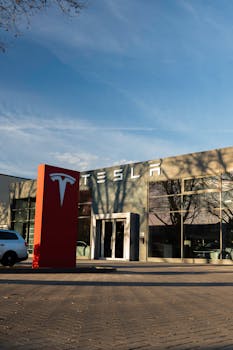
**
Tesla's CEO, Elon Musk, recently predicted a "major rebound" in Tesla sales figures. However, this optimistic forecast clashes starkly with the reality on the ground, particularly in Europe, where Tesla sales continue to lag. While the company has seen some success in other regions, the persistent slump in European markets raises serious questions about Tesla's long-term strategy and its ability to compete effectively in a rapidly evolving EV landscape. This article delves into the reasons behind Tesla's European struggles and examines what the future holds for the electric vehicle giant.
Tesla's European Sales Slump: A Deeper Dive
The recent drop in Tesla's European sales isn't a minor blip; it represents a sustained trend that's causing concern amongst analysts and investors alike. While Tesla remains a dominant player in the global EV market, its performance in Europe is significantly underperforming expectations. Several factors contribute to this decline, ranging from intensified competition to increasing consumer dissatisfaction.
The Rise of European EV Competitors
Tesla once enjoyed a near-monopoly in the premium electric vehicle segment. However, established automakers like Volkswagen, BMW, and Mercedes-Benz have aggressively entered the market with their own compelling EVs. These competitors offer comparable technology and features, often at more competitive price points. Models like the Volkswagen ID.3, BMW i4, and Mercedes-Benz EQS directly challenge Tesla's dominance in various segments. The sheer variety and availability of alternatives significantly impact consumer choice. This increased competition has led to a saturation of the market, making it harder for Tesla to maintain its market share.
Growing Consumer Dissatisfaction: Quality Control and Customer Service
Numerous reports from European consumers highlight issues with Tesla's quality control and customer service. Complaints regarding build quality, paint defects, and software glitches are increasingly common. Furthermore, the absence of a robust dealer network in many European countries exacerbates problems, leading to lengthy repair times and frustrated customers. This negative word-of-mouth significantly impacts brand perception and discourages potential buyers. The "Tesla experience," once considered a selling point, is now frequently cited as a source of dissatisfaction among European owners.
Rising Prices and Economic Uncertainty
Tesla's pricing strategy has also faced criticism. While the company has recently undertaken price cuts in certain markets, the overall cost of Tesla vehicles remains high, especially considering the rising cost of living across Europe. Coupled with economic uncertainty and inflation, this high price point significantly impacts consumer affordability, limiting the potential buyer pool. The current economic climate makes luxury purchases, including electric vehicles, less attractive for many consumers.
The Impact of Government Incentives and Subsidies
Government incentives and subsidies play a crucial role in driving EV adoption. The availability and structure of these incentives vary considerably across different European countries. Tesla's success in specific markets often correlates with the generosity of the government's support for electric vehicles. The complexities and inconsistencies of these schemes across the continent create challenges for Tesla's consistent market penetration.
Musk's Controversial Actions and Brand Image
Elon Musk's unpredictable behavior and controversial statements have also negatively impacted Tesla's brand image in Europe. While some consumers may be drawn to his maverick persona, many find his actions off-putting and damaging to the company's reputation. This factor, while intangible, likely contributes to the declining sales figures. The perception of the brand is inextricably linked to its CEO, and negative publicity undoubtedly affects sales.
What's Next for Tesla in Europe?
Tesla faces a significant challenge in revitalizing its European sales. To address the ongoing slump, the company needs to adopt a multi-pronged approach:
- Improved Quality Control: Implementing rigorous quality control measures to minimize defects and enhance customer satisfaction is paramount.
- Enhanced Customer Service: Establishing a more robust and responsive customer service network across Europe is essential to addressing consumer complaints effectively.
- Competitive Pricing Strategies: Developing a more flexible and competitive pricing strategy to align with the economic conditions and consumer affordability in each market is crucial.
- Strengthened Brand Image: A concerted effort to improve Tesla's brand image through responsible communication and positive brand-building initiatives is necessary to counteract negative publicity.
- Focus on Local Markets: A better understanding and adaptation to the specific needs and preferences of each European market is essential.
Tesla's European sales struggles highlight the increasingly competitive nature of the EV market. Simply relying on brand recognition and past successes is no longer sufficient. The company needs to adapt to the changing market dynamics, address consumer concerns, and implement a comprehensive strategy to regain its lost momentum. Whether Elon Musk's predicted "major rebound" will materialize in Europe remains to be seen, but the challenges facing Tesla in this critical market are undeniably significant.




















